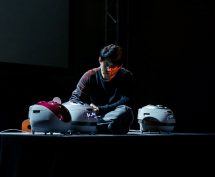Cuckoo

By Jaha Koo
(Oz Asia Festival – Space Theatre, Adelaide 25 October 2019)
TVC has had problems with rice cookers before – but never like this. Hana (the quiet one) makes the rice (which smelt very nice); Duri (the alpha one) talked about making rice, but mainly traded pungent barbs with the florid one, Seri, who came with coloured L.E.D and a boppy soundtrack (the local brand name for the cookers is “Cuckoo”). Their owner, auteur Jaha Koo, uses these appliances as a trope for the plight of his nation, South Korea, in the wake of the Asian economic crisis of the late 1990s. His bête noire, or one of them, is Robert Rubin, President Clinton’s Treasury Secretary, who led the $50b IMF bailout described as Sth Korea’s ‘Day of Shame,’ and his thesis appears to be that the country, in agreeing to the ‘rescue,’ traded fiscal rectitude for national independence, putting lots of folks under plenty of heat and pressure. The idea is that ordinary people – who had little to do with creating the crisis – were pressure-cooked and scooped-up, packed and spat-out like the cakes of rice assembled at the finale.
This is a clever piece: in slightly over an hour, with a combination of telerobotic by-play (the Cuckoos observe Asimov’s 3 Laws and turn on each other instead) projected images (some very confronting – be warned*) and direct speech by Koo to the audience, the layers of damage done to the people’s psyche after the economic crisis – through various stats, oral autobiography, and some deeply personal, tragic, vignettes – are reprised in a very dark and moving way.
We have to take issue with the central thesis: that this state of flux and economic repression can be solely attributed to the assistance-with-strings given in 1997-98. We would hazard a guess that the writer/director/actor is not a fiscal conservative. He probably rejects the real causes and effects of the crisis: too many countries in Asia lacked fiscal discipline, engaged in crony capitalism, had inflexible exchange rates and massively over-valued assets – the price exacted by the US (on behalf of the IMF), and Japan and Australia (the only countries to provide additional assistance to help Korea adjust to the downturn) was to require better monetary policy, balanced books, and increased productivity, which over time led to increased confidence, better investment, higher employment, and a rise in the standard of living.
In the final analysis, however, this is not the real point. Jaha Koo is like a Dickens who can’t provide a remedy, or even perhaps an explanation, for the prevailing malady. But he can vividly describe the symptoms, with accuracy, with humour, with anger, and with compassion. Cuckoo gave us that.
——————————————————————————————————–
[*suicides, isolation and acute social withdrawal, unemployment, a sense of ennui, malaise and despair – these are some of the symptoms at play in Cuckoo, and they can be hard to watch and hear. But subject to warning viewers with particular vulnerability, we thought none of them are presented or imagined in any gratuitous or exploitative way.]Leave a comment...
While your email address is required to post a comment, it will NOT be published.



0 Comments